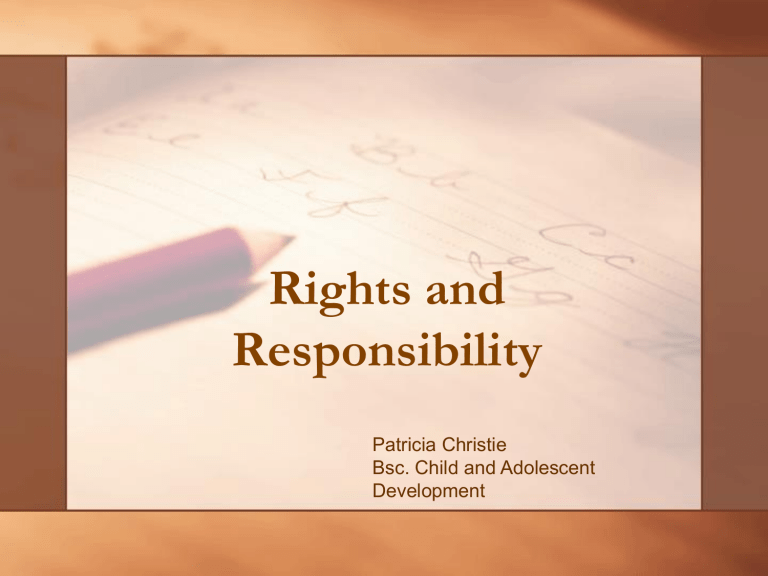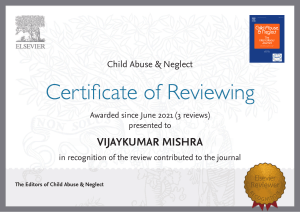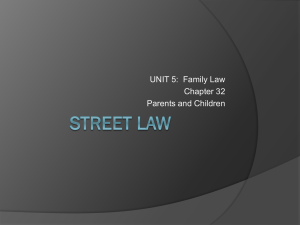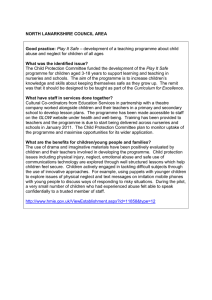
Rights and Responsibility Patricia Christie Bsc. Child and Adolescent Development Objective • History on the rights of the child • The best Interest of the child • Who is a child • The Categories of Rights • Responsibilities to Rights What are Human Rights? • Human rights are the basic rights and freedoms that belong to every person in the world, from birth until death. • They apply regardless of where you are from, what you believe or how you choose to live your life. • They can never be taken away, although they can sometimes be restricted • These basic rights are based on shared values like dignity, fairness, equality, respect and independence. • These values are defined and protected by law. Convention on the Rights of the child • One of the most widely accepted human rights agreement adopted by the United Nations. • It sets out the wide range of rights which should be enjoyed by all children throughout the world • Recognizes the child as an individual with needs that changes as the child matures • Balances the rights of the child with rights and duties of parents • On January 26, 1990, Jamaica signed the Convention on the Rights of the Child and ratified it on May 14, 1991, which made it binding law in this country. Definitions • What is a right? • A right is an entitlement – it entails a legal obligation by government and other duty bearers for its provision and protection and can be enforced • Who is a Child? • A child is any human being under the age 18 years unless the law of the country states that a child becomes an adult at an earlier age. SURVIVAL RIGHTS Protecting the Child’s right to survival The Right to Survival • Every child has the right to survive. • Recognized as the most basic human rights • It includes the provision of; • Food, Clothing and Shelter • A good start in life with opportunities to grow and develop • Love, care and nurturing • Protection in times of disaster and emergencies The right to medical and health care • Every child has the right to the best possible medical and health care. • This includes • Ensuring that each child is protected from all form of diseases through immunization • Getting prompt medical attention when the child is sick DEVELOPMENTAL RIGHTS Helping the child achieve his/her full potential The right to a Name and Nationality • Every child has the right to be registered immediately after birth to establish his/her name, nationality, identity and family ties. • The right to a name is considered the child’s ‘first right’ • A child can be denied the right to access health, education and other services without a birth certificate • As far as possible each child should know and be cared for by his/her parents The right to a home and family • Every child has the right to a home • Both parents should take responsibility for the raising and development of each child. • It challenges parents to; • Provide for the basic needs of each child • Give each child plenty of love and attention • Guide the child towards making wise decision • Protect each child from unnecessary risk The right to an education • Every child has the right to an education • Every child age 4 to 16 should be enrolled in school. • Education prepares each child to become a responsible and independent individual. The rights to play and leisure • Every child has a right to leisure time, play and involvement in cultural and artistic activities • This will help children to • Develop their imagination and self expression • Learn cooperation, sharing and teamwork • Grow physically and develop talents and potential in sports art and cultural actives • Build positive attitudes and values The right to privacy • Every child has the right to be protected from undue interference with his/her privacy, family, home and correspondence and from attacks on his personality • Your child should be given privacy and treated with respect • Parents should protect their child from harmful influences by being aware of what is happening in their lives • Children personal information should be kept confidential Religious and moral guidance • Parents should provide religious , moral and spiritual direction for each child. • This helps to teach right from wrong, provide guidance and help to promote good conduct in society • Issues relating to religion are complex and vary greatly all over the world • Parents should provide guidance based on the child’s capacity and maturity Giving children a voice. PARTICIPATION RIGHTS The right to be heard • Every child has the right to be heard, especially in proceedings that affect their life • The child should be allowed to give information and ideas either by • Speaking, writing, art or any method the child select • Once a child is old enough his or her views should be considered in matter affecting the child. The right to information • Every child should be encouraged to read a wide variety of information and educational materials • This helps the child to develop his/her full potential • Help to promote the child intellectual, social, moral and spiritual well being • The convention challenges government to protect children from material injurious to their well-being The right to join group and associations • Every child should be encouraged to join groups and association with other children in their own age group. • This will help them develop a wide range of interest and assist in the process of building confidence and character • Adult guidance should be available to children’s group to ensure their protection and development. Protect the child from harm PROTECTION RIGHT Protection from exploitation • Every child should be protected from any form of exploitation. • Sexual exploitation • Having sex with someone for money, gift, or other things as well as involvement in prostitution and pornography • Child Labor • Involves children doing work that threatens their health and educational • No child below 12 years old should be employed Protection for Disabled • Every child with a disability should enjoy the best possible life in society. • The child with disability should be protected from • Lack of compassion • Abuse neglect and abandonment • Separation from home and family • Lack of opportunity for education • Lack of access to special services because of cost Protection against discrimination • Every child must be protected from all forms of discrimination irrespective of • Who his or her parents are • Race, gender, social class’ • Culture or creed • Religious and political opinions • Illness Protection from abuse and neglect • Every child should be protected from all forms of abuse and neglect. • This include; • Physical abuse• when a child is beaten violently, burnt, punched, or kicked and suffers pain or injury as a result. • Emotional abuse • When a child is told negative things about themselves Protection from abuse and neglect • Neglect or abandonment • When a child is left alone for prolonged periods without supervision or support • Sexual abuse and molestation • When older person make sexual contact by touching or playing with the child’s genitals or having sexual intercourse with the child • Incest • Sexual intercourse between family members who are blood related • Children have the right to be protected from abuse and harm; and I should show care for others and not bully other children. • have the right to a clean and safe environment; and I should find ways to keep my own surroundings clean and safe. • I have the right to be cared for and respected; and I must respect others and show care for them • I have the right to be taken seriously and share my views and ideas. I must also listen to others and respect their views and ideas • I have the right to healthy and enough food; and I should try to eat healthy food and not waste food Responsibilities Responsibilities • In addition to rights, children also have responsibilities, like adult members of the society. • A child’s rights end where the rights of another child or an adult begin. • This means that rights have limits and a child must consider the rights of other children and adults when exercising his/her rights. • Rights and responsibilities go hand in hand. Responsibilities • I have the right to special care and support when I need it; and should use every chance to be the best person I can be. • I have the right to play, have fun, do sport and relax; and I should include everybody in my activities and games. • I have the right to try new things and make mistakes; and should learn from my mistakes and not repeat them. • I have the right to a good quality education; and I have to learn, do my homework, read and take part in the classroom. FOOD FOR THOUGHT The basis for a mutually respectful living environment is mutual respect. Children must respect adults (parents, grandparents, and school teachers, etc.) and other children like adults must respect children and other adults. Mutual respect and consideration of wishes is one of the important premises of the society's coexistence.



